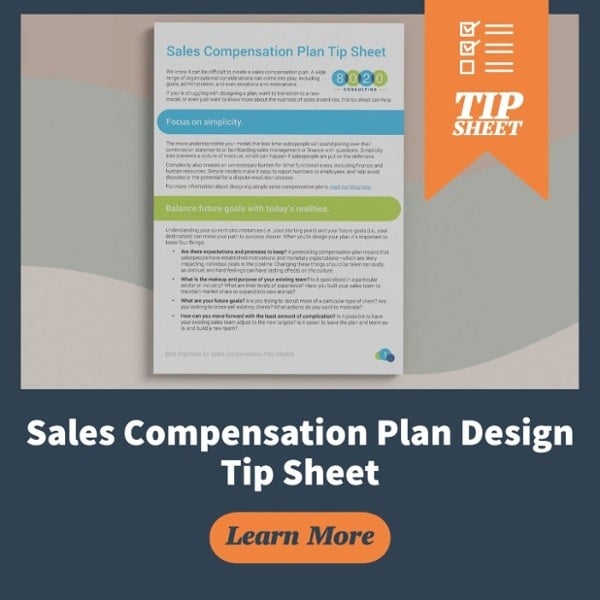
Companies with high-growth trajectories and those that reach a modicum of complexity with their incentive plans will want to invest in a robust Sales Performance Management (SPM) software system. Those organizations that are poised for sales force expansion will want not only a system capable of calculating commissions and incentive plans but also automating them. Once a company reaches a threshold of complexity or volume of incentive based employees they will find its more efficient and economical to deploy a specialized software system rather than hire more full time employees to handle the monthly calculation work. The work includes month end close, reporting, statements for payees, payroll, but also a significant amount of time on dispute resolution. What was once a one-person job quickly turns into a department frustrated with the inability to streamline the process and provide superior customer service to the sales force.
Once executives have visibility into the problem of monthly commissions management, it is often too late for an internal resolution.
The solution is now a third-party software platform that brings new complexities, is a drain on resources, and usually comes with an unexpected price tag. So how should management decide on a course of action? Below is a list of items for consideration:
Complexity
Third-party software is not needed if a company can successfully manage calculation of commissions on its own when the incentive plans utilize minimal variables and have a limited work force on commissions. If, however, your Excel spreadsheets are starting to look unmanageable and require two people to maintain, it may be time to invest in another solution. Typically, 100 payees or 25 variable plans signal the need to start looking for help. If you have multiple currencies, international payrolls, splits and revenue recognition considerations a third-party solution is probably needed. (You can read more about keeping it simple in our sales compensation plan design tip sheet.)
Dispute Resolution
Your sales force is getting larger and demanding more personal attention. Complexity in sales plans lead to more opportunities for calculation errors which leads to disputes from your payees. Disputes take time and require tracking, approvals from management, communication with accounting and payroll. When you have more than 100 payees, calls, emails, texts and Slack messages multiply for your commissions specialist and never yield. A scalable platform that allows for not only tracking of this communication but automation of self-service resolution is required.
Audit
High-growth companies with financial backing as well as medium-sized companies with banking relationships require consistent audited financials. Keeping track of commissions, bonuses, one time payments, and spiffs while maintaining strict financial controls and following revenue recognition rules can be daunting. Public companies face even more scrutiny. A sales performance management system can provide ASC 606, capitalization and amortization support, and integration with the ERP solution.
Transparency
Depending on the company culture, management may want to provide minimal, partial or complete transparency about commission calculations and amounts to their sales force. A nimble and user-friendly system allows the resident commissions admin to provide variable degrees of transparency to executives, account managers, admins and payees. Transparency drives better understanding of the commission process, lowers dispute needs, and motivates the workforce through leaderboards, gamification and visibility into accurate bonus estimation.
Selection
Once your organization determines that a Sales Performance Management software is appropriate, selecting one may seem complicated as well. Vendors that specialize in Sales Performance Management solutions can range from simple off the shelf software to more sophisticated solutions that require a deep understanding of finance, accounting, IT, and require significant project management and implementation leadership. A good place to start is with the annual Gartner Magic Quadrant report on SPMs. This report tracks the leaders (Callidus Cloud, Xactly, Anaplan) and new entrants (Iconixx) in the segment. Next, schedule demos with the vendors that fit your industry, budget, and implementation timeline. Finally, try to speak with companies that already have deployed the vendor solution you are considering to understand the efficacy of the solution, total costs, and customer service levels post implementation.
A Note About Sales Performance Management Software Implementation
Sales Performance Management is a necessity for growing successful companies that have a significant sales force with complex incentive plans.
And implementing the chosen SPM solution is as important as the selection process.
Remember that a 1% error rate could mean thousands if not hundreds of thousands in losses per year. Making an investment to get your sales compensation planning right from the start will more than pay for itself over the long run. It will also put less strain on your internal resources and drive adoption among the sales force. Companies should no longer settle for calculation and automation of incentive pay, but aim for optimization to drive forecasting and better financial management.
For more information on selection and implementation expertise, contact us or view our financial system consulting services page:
About the Author
Matt Kim-Perek has more than 20 years of finance and accounting experience across entertainment, business services, telecom and high-tech industries in both private and public companies. As a consultant, Matt has managed strategic projects, advised on M&A transactions, provided pre/post IPO services, created budgeting and forecasting models and performed system implementations, including Anaplan. Prior to 8020 Consulting, Matt worked at CSG International, Anthem, and Imperial Capital, where he provided buy-side and sell-side investment banking services to private equity clients. Most recently, Matt served as Interim CFO at GeoLinks, a high-growth wireless tech company. Matt completed his undergraduate work at UCLA and earned his MBA from USC Marshall School of Business.





